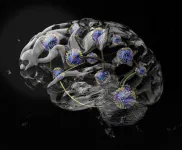(Press-News.org) New findings from the University of Houston Department of Health and Human Performance reveal a significant association between a lower number of positive childhood experiences and a higher prevalence of binge-eating disorder characteristics, as well as lower scores for intuitive eating.
Binge eating, which includes consuming a substantial amount of food within a brief timeframe and experiencing a loss of control, is linked to adverse weight-related health effects and challenges in mental well-being. Intuitive eating, which includes listening to the body’s hunger signals and trusting them to guide decisions about what, when, and how much to eat, as well as when to stop eating, is linked with better physical and mental health and well-being.
“Although childhood experiences encompass both positive and adverse experiences, most studies have primarily focused on adverse childhood experiences, which has resulted in less known of the positive childhood experiences in relation to eating behaviors,” reports HHP Assistant Professor Cynthia Y. Yoon in the journal Appetite. “While most research on positive childhood experiences has concentrated on their links to mental health, we expand the existing knowledge base by examining their association with characteristics of binge-eating disorders and intuitive eating.”
Yoon collected data from 828 college students in Texas to examine their positive childhood experiences including positive interactions with parents and caregivers, feelings of relational and internal safety, enjoyment of pleasurable and predictable quality of life, and support from sources outside the family.
“Our study revealed a significant association between a lower number of positive childhood experiences and a higher prevalence of binge-eating disorder characteristics, as well as lower scores for intuitive eating,” said Yoon. “Specifically, when comparing college students who reported having 9-10 positive childhood experiences to those with 0-4 positive childhood experiences, the latter group had 37% to 92% higher prevalence of binge-eating disordered eating behaviors and had 3.89 points lower score on intuitive eating, emphasizing the importance of promoting positive childhood experiences.”
Notably, among the ten positive childhood experiences examined, intrapersonal positive childhood experiences (e.g., feeling comfortable with oneself) emerged as a factor that was consistently associated with less prevalence of binge-eating disorder characteristics and higher score of intuitive eating among college students.
“These findings imply the importance of early interventions and the need to foster supportive environments to promote healthier well-being,” said Craig Johnston, associate professor and department chair, HHP. “Achieving a comprehensive understanding of these intricate relationships holds the potential to shed light on the precise mechanisms through which childhood experiences shape eating behaviors.”
END
Limited positive childhood experiences linked to higher binge-eating risk in college
Study also finds positive experiences in childhood tied to healthier intuitive eating
2023-11-13
ELSE PRESS RELEASES FROM THIS DATE:
Rensselaer Polytechnic Institute Nanotechnology expert Nikhil Koratkar named American Physical Society Fellow
2023-11-13
Nikhil Koratkar, Ph.D., John A. Clark and Edward T. Crossan Professor of Engineering at Rensselaer Polytechnic Institute, has been named a fellow of the American Physical Society (APS). Koratkar was recognized for his pioneering contributions to the field of nanoscale science and technology and the use of nanoscale materials in composites and energy storage devices. Each year, no more than 0.05% of the society membership is recognized by their peers for election to the status of fellow of the American Physical Society.
The APS Fellowship Program recognizes members ...
Children’s National Hospital selected as member of ARPA-H Investor Catalyst Hub spoke network
2023-11-13
WASHINGTON, D.C. (Nov. 13, 2023) – Children’s National Hospital was selected as a spoke for the Investor Catalyst Hub, a regional hub of ARPANET-H, a nationwide health innovation network launched by the Advanced Research Projects Agency for Health (ARPA-H).
The Investor Catalyst Hub seeks to accelerate the commercialization of groundbreaking and accessible biomedical solutions. It uses an innovative hub-and-spoke model designed to reach a wide range of nonprofit organizations and Minority-Serving Institutions, with the aim of delivering scalable healthcare outcomes for all Americans.
“The needs of ...
Antiviral treatment is largely underused in children with influenza, study findings show
2023-11-13
Despite national medical guidelines supporting the use of antiviral medications in young children diagnosed with influenza, a new study reports an underuse of the treatment.
“Trends in Outpatient Influenza Antiviral Use Among Children and Adolescents in the United States” was published in Pediatrics, a peer-reviewed journal of the American Academy of Pediatrics.
“Antiviral treatment, when used early, improves health outcomes with influenza,” said lead author and principal investigator James Antoon, MD, PhD, MPH, assistant professor of Pediatrics and Hospital ...
Twisted magnets make brain-inspired computing more adaptable
2023-11-13
A form of brain-inspired computing that exploits the intrinsic physical properties of a material to dramatically reduce energy use is now a step closer to reality, thanks to a new study led by UCL and Imperial College London researchers.
In the new study, published in the journal Nature Materials, an international team of researchers used chiral (twisted) magnets as their computational medium and found that, by applying an external magnetic field and changing temperature, the physical properties of these materials could be adapted to suit different machine-learning tasks.
Such an approach, known as physical reservoir ...
New heat map charts unequal civic opportunity in the US
2023-11-13
People in many parts of the United States possess few chances for the robust community engagement that underpins healthy democracies, according to a new report that for the first time maps civic opportunity across the country.
The heat map created by Johns Hopkins University’s SNF Agora Institute, reveals patterns of inequality in civic opportunity tied to race, class, immigration status and education. Researchers also found that a great deal of civic engagement happens through local faith institutions and social and fraternal organizations, not D.C.-based advocacy organizations that tend to carry political clout.
The report is the initial phase ...
One step closer to Mars immigration
2023-11-13
Immigration to and living on Mars have long been depicted in science fiction works. But before dream turns into reality, there is a hurdle man has to overcome -- the lack of essential chemicals such as oxygen for long-term survival on the planet. However, hope looms up thanks to recent discovery of water activity on Mars.
Scientists are now exploring the possibility of decomposing water to produce oxygen through electrochemical water oxidation driven by solar power with the help of oxygen evolution reaction (OER) catalysts. The challenge is to find a ...
National survey indicates more young adults begin tobacco use with vaping, not cigarettes
2023-11-13
Young adults are now more likely to vape than to use traditional cigarettes. After years of public health success in decreasing the numbers of people using cigarettes, researchers are seeing striking increases in the numbers of young people who use e-cigarettes regularly – so much so that, for the first time, there are more young people who begin to use nicotine through vaping rather than through cigarettes.
“We now have a shift such that there are more ‘never smokers’ who vape than established smokers,” ...
Widening gender gap in life expectancy in the US
2023-11-13
About The Study: This analysis finds that COVID-19 and the drug overdose epidemic were major contributors to the widening gender gap in life expectancy (nearly six years) between women and men in recent years. Men experienced higher COVID-19 death rates for likely multifactorial reasons, including higher burden of comorbidities and differences in health behaviors and socioeconomic factors, such as labor force participation, incarceration, and homelessness. Differentially worsening mortality from diabetes, heart disease, homicide, and suicide suggest that chronic metabolic disease and mental illness may also contribute.
Authors: Brandon W. Yan, M.D., ...
Shift from smoking cigarettes to vaping nicotine in young adults
2023-11-13
About The Study: The data from this nationally representative survey study reveal a shift in tobacco use among young adults (ages 18-24), showing historically low cigarette use, which has positive public health significance. However, e-cigarette use is higher (14.5%) than reported previously, coinciding with the introduction of salt-based devices in 2015 to 2018. Over half of established vaping young adults never regularly smoked. Research suggests that exclusive e-cigarette users are unlikely to ...
Trends in prevalence of breastfeeding initiation and duration among US children
2023-11-13
About The Study: The findings of this study indicate an increase in the prevalence of breastfeeding initiation and breastfeeding duration at 12 months from 1999 to 2018 in the U.S. Temporal changes of breastfeeding duration at 12 months were more prevalent among male infants, older mothers, Mexican American and multiracial participants, and households with higher income.
Authors: Yongjun Zhang, Ph.D., M.D., of the Shanghai Jiao Tong University School of Medicine in Shanghai, is the corresponding author.
To access ...
LAST 30 PRESS RELEASES:
A kaleidoscope of cosmic collisions: the new catalogue of gravitational signals from LIGO, Virgo and KAGRA
New catalog more than doubles the number of gravitational-wave detections made by LIGO, Virgo, and KAGRA observatories
Antifibrotic drug shows promise for premature ovarian insufficiency
Altered copper metabolism is a crucial factor in inflammatory bone diseases
Real-time imaging of microplastics in the body improves understanding of health risks
Reconstructing the world’s ant diversity in 3D
UMD entomologist helps bring the world’s ant diversity to life in 3D imagery
ESA’s Mars orbiters watch solar superstorm hit the Red Planet
The secret lives of catalysts: How microscopic networks power reactions
Molecular ‘catapult’ fires electrons at the limits of physics
Researcher finds evidence supporting sucrose can help manage painful procedures in infants
New study identifies key factors supporting indigenous well-being
Bureaucracy Index 2026: Business sector hit hardest
ECMWF’s portable global forecasting model OpenIFS now available for all
Yale study challenges notion that aging means decline, finds many older adults improve over time
Korean researchers enable early detection of brain disorders with a single drop of saliva!
Swipe right, but safer
Duke-NUS scientists identify more effective way to detect poultry viruses in live markets
Low-intensity treadmill exercise preconditioning mitigates post-stroke injury in mouse models
How moss helped solve a grave-robbing mystery
How much sleep do teens get? Six-seven hours.
Patients regain weight rapidly after stopping weight loss drugs – but still keep off a quarter of weight lost
GLP-1 diabetes drugs linked to reduced risk of addiction and substance-related death
Councils face industry legal threats for campaigns warning against wood burning stoves
GLP-1 medications get at the heart of addiction: study
Global trauma study highlights shared learning as interest in whole blood resurges
Almost a third of Gen Z men agree a wife should obey her husband
Trapping light on thermal photodetectors shatters speed records
New review highlights the future of tubular solid oxide fuel cells for clean energy systems
Pig farm ammonia pollution may indirectly accelerate climate warming, new study finds
[Press-News.org] Limited positive childhood experiences linked to higher binge-eating risk in collegeStudy also finds positive experiences in childhood tied to healthier intuitive eating






